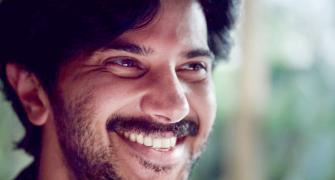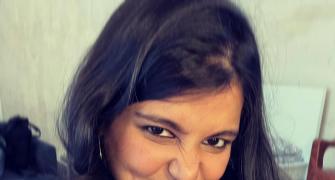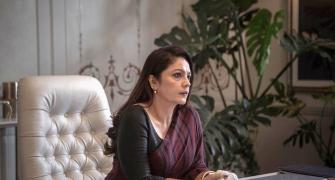'At the end of the day, we are all humans.'
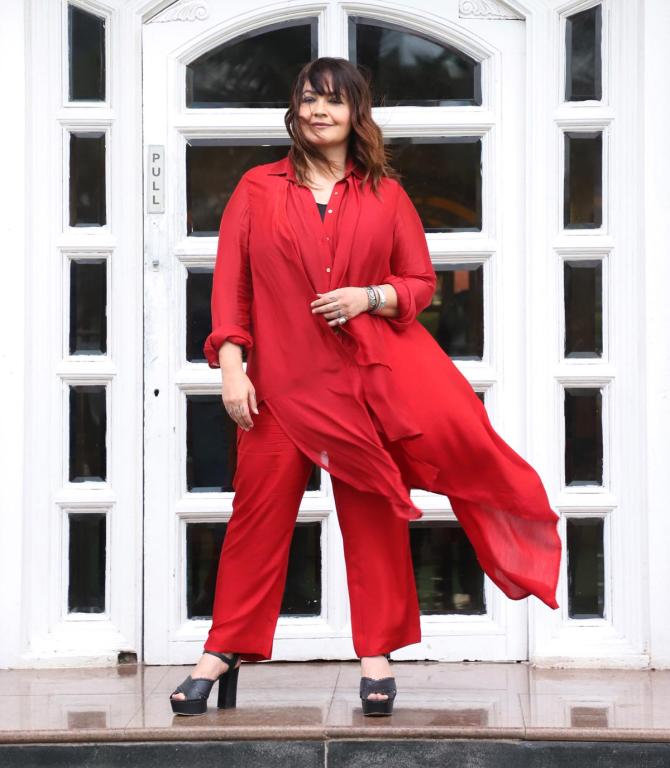
Pooja Bhatt may be acting in Chup, but there's no way you can silence this outspoken actor-film-maker.
After making her comeback in the well-reviewed Bombay Begums, Pooja joins hands with a beautiful assortment of actors like Sunny Deol, Dulquer Salmaan and Shreyas Dhanwanthary in Balki's Chup: Revenge Of The Artist, a film about a serial killer who eliminates film critics who give negative reviews.
But she's not talking about her film yet.
In a fascinating multiple-part interview, Pooja discusses her greatest learnings as an actress, as she tells Rediff.comContributor Mohnish Singh, "Mithun Chakraborty and Rishi Kapoor were the most under-rated actors who got their due much later in life. Why? Because they didn't sit down and turn acting into a master class. They have been my strangest teachers at that time."
You were sharing your experience of working with Mithun Chakraborty and Rishi Kapoor a while ago. Let's pick this conversation up where it was left off.
So I was shooting with Mithunda in Malaysia for a film called Naaraaz (1994).
There was heavy traffic, and we had very little time to complete that shot.
We did the shot and I was walking back with him across the road.
During those days, we did not have make-up vans and all of that.
We were crossing the road, and we stopped.
I said, 'Dada, I feel the shot was not up to the mark.'
He literally turned in the middle of the street, traffic stopped, and said not to do this again.
He said, 'Yeh perfection ka bhoot na nikaalo apne jism se, apne zehen se.'
He said, 'Give your everything in the first two shots and then forget about it. Aisa hona chahiye tha, waisa hona chahiye tha, wo bhool jao.'
He added, 'Whether it's in life or shots, no difference. Never think that I should have done this. I should have done that. Give it your best and move on.'
That lesson stayed with me forever, and I try to apply it to every area of my life.

You learnt a lesson from Rishi Kapoor too.
Rishi Kapoor was the most effortless actor if there was ever one.
I worked with him and Nana Patekar on a film called Hum Dono (1995). They are two different ends of the spectrum.
That was a fun film, actually, and Shafi (Inamdar) made it much, much easier.
We had a great camaraderie.
Rishi Kapoor was so easy. It was amazing for me because he had seen me as a child.
(Mahesh) Bhattsaab had shot with him in Naya Daur (1978) and Ab Meri Baari, which got shelved halfway. So he knew exactly how much to give in every shot.
He once told me, 'Don't give more than what is required.'
He said it had to be like breathing: 'You have to be you, just whatever the flaws are. If there is a way you speak, speak that way. You have a lisp; you don't have to cover it up. This is your body type. This is your way of speaking. That's why people like you. If you have to be like somebody else, then why will they come to you? They will go to that somebody else.'
So I learned to, in that sense, let go.
At that time, I felt both of them were the most underrated actors who got their due much later in life.
Why? Because they didn't sit down and turn acting into a master class.
They made it as simple as 'wait for a second. I will just complete my shot.'
Done and back to, 'Yes, tell me what I can do for you.'
So that is the switch on-switch off mode that I learned from Rishi Kapoor.
They have been my strangest teachers at that time.

When did you meet Rishiji for the last time?
I remember I had gone to Chandigarh, where Daddymwas being performed as a play. At that time, Alia's film Raazi had released.
Bhattsaab and I had gone to Chandigarh to watch the show.
At the end of it, they called us on stage, where I spoke about the fact that while I was a 17-year-old girl who had done Daddy, who had weaned off her father from alcohol, I found myself at the age of 46 battling the same problem and how I had to take hold of myself and then give up the booze.
That made big news.
On the front page of Chandigarh Times, Alia Bhatt was seen holding a gun, and on the other side, Bhattsaab and I were on stage.
I was going to fly back, and I met him (Rishi Kapoor) at Chandigarh airport.
We were on the same flight, so he was like, 'What are you all doing? It looks like you have kidnapped all the newspapers.'
I said, 'Well, it has kind of happened like that.'
He said, 'Oh, you quit drinking?'
I said, 'Yeah, of course, I did.'
He was like, 'Oh! But I won't quit.'
I said, 'I am not asking you to quit, sir.'
I remember the two of us were sitting in two different seats.
The air hostess came and told me, 'Mr Kapoor wants to know whether he can sit with you.'
I said, 'Of course.'
Then we had a cup of coffee together and took a picture.
We started talking; at that time, I was planning Jism 3.
I said, 'I am looking at it as a completely different kind of heroine because after Sunny Leone, who would you introduce on screen? You have done the sex symbol number, so you need a new kind of sex symbol. According to me, I find there is far more intimacy and erotica when you don’t see everything.'
He agreed with me, and then asked, 'What is happening in your life? Are you in a relationship?'
I said, 'No.'
He said, 'Good. You don't need to have a man in your life. You just work now; you are meant to be there in the field.'
That was the last time I saw him.
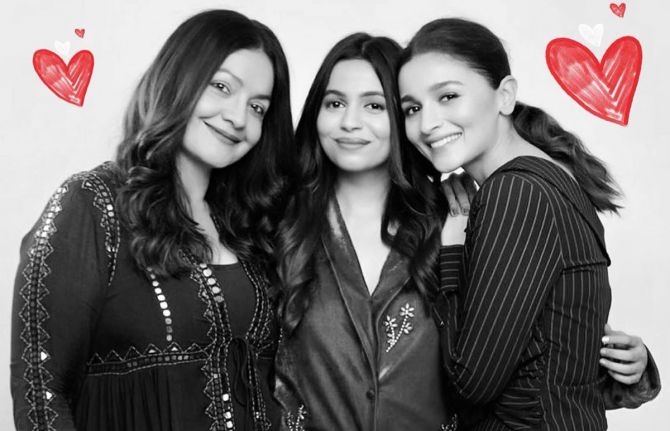
You have worked extensively in the 1990s. Indian cinema has evolved a lot over these years. What kind of difference do you see?
I think the audience has grown up far more than we have.
I think their exposure is far greater than before, as you can see any kind of cinema from anywhere in the world by pressing a button,
It's like a buffet.
Netflix, Amazon Prime Video and Disney+ Hotstar are giving us so many choices that I no longer feel hungry now.
So I feel the audience has certainly evolved.
There is also a lot more available to us with regard to the tools with which we make our movies. Like special effects.
Make-up vans were not there back in the day.
So Tabu (on the set of Border) was asking me where we would get ready, and I said, 'You simply pitch your tent at the location of the shoot and get to work.'
In Film City, we used to shoot on top. We had to go downstairs to the main building and climb up two floors to go to the loo. Who had the time and energy? So you just went to a corner because you had to go, right?
There was no focus on 'Oh, this is not luxurious and this does not have an AC.'
It was just about managing with what you had and getting the job done because everyone came together to resolve the problem.
I find today, while there is a lot of professionalism and a lot more things available, it has somehow handicapped people because you can't work without your stylists and your make-up artists and the ideal temperature...
We used to get dead tired while dubbing.
First, you need to act, and then replicate it in the dubbing studio alone.
Now, sync-sound is a boon.
I feel there was a kind of discipline earlier with the medium.
Also, I find that with a lot of new people who have come on to sets -- which is good because they bring different kinds of professionalism, a different perspective -- but there is a sacred place in front of the camera.
As a child, we used to go for screenings. At that time, screenings used to take place at Ketnav Theatre. If you remember the layout of Ketnav, the door was right in front of you, and you had to enter from the front, and the audience was sitting there.
So if you arrived five minutes late, you were taught as a child to never walk straight in front of a screen. You had to bend and walk, so that you don't obstruct somebody's view.
Now, the actor will come, five people will come, another actor will come, ten people will come, and everybody will walk in front of the camera, as if they are taking a stroll in the garden.
That irks me because we were taught to never look into the lens.
You cannot do that; it's sacred, you know.
Why do we break the coconut and perform pooja in front of Ganpati? Everyone says 'Bappa Morya', no matter who you are.
This is the industry, yaar.
Don't you feel we have lost the soul?
Cinema is not a medium of the head, it's a medium of the heart.
That's why my father (Mahesh Bhatt, who is 74 today, September 20) always said, 'You should not defy, you should gratify.'
Our job is to gratify. We should not edify.
Stop making people feel like they are Gods. At the end of the day, we are all humans.
It's our job to entertain you, make you cry, and evoke a feeling inside you.
You have got phones, and you have got connectivity. But I feel we have lost connectivity.
The reason I am not on WhatsApp is that people say you have not talked to me for 10 days. Then you are like, 'Arrey, no, I WhatsApped you.'
That is not talk.
Talk, pick up your phone, listen to the voice, say hello, how are you?
People confuse forwards for communication.
Where is the human contact?
So while we have gone leaps ahead, we have gone five steps behind at the same time.
That applies to every area of life, not just movies.
If society has less humanity, why are you expecting that from the movies?


